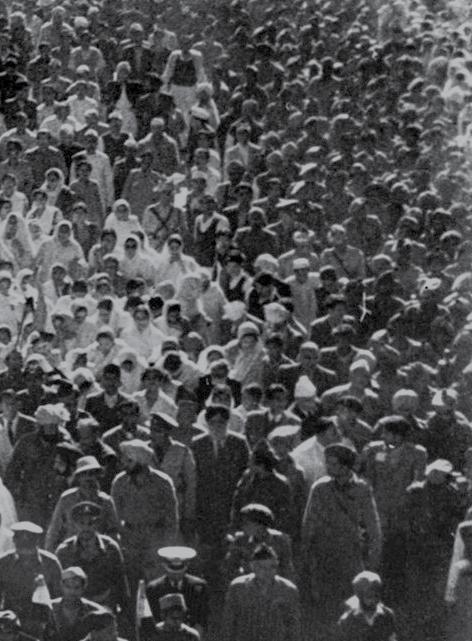
5 minute read
Reparations: a “Matter of Principle”? By Rosa Simonet
by MONSOON
REPARATIONS: A ‘ M A T T E R O F PRINCIPLE?’
THE QUESTIONS WE NEED TO ASK ABOUT REPARATIONS
Advertisement
BY ROSA SIMONET
Shashi Tharoor claimed reparations as a matter of principle, dismissing the questions ‘how much?’ or ‘who to?’ But these issues are far too important to ignore. The demand for reparations should be making us inquire beyond the debt owed and to the remnants of colonial and secretive rule.
In May 2015, the Oxford Union held a debate on the motion ”This house believes Britain owes reparations to her former colonies,” in which Shashi Tharoor (member of the Indian National Congress) provided a powerful defence, sparking international debate, as well as support from the Indian state. In his speech, which gained over three million views on Youtube, Mr Tharoor provides examples of the exploitation of Indian peoples and economy for the gain of British colonialists during two hundred year long period of colonialism. He argues the demand for reparations is not a matter of vast amounts of money being given to the Indian government but a matter of ‘principle,’ and that the admittance of a debt owed is far more significant than a percentage in GDP.
There is no doubt of the monstrosities committed by the British during the mission of the ‘Great’ empire. As well as those committed in India, the ‘wrongs,’ Mr Tharoor refers to include the slaughter of over 25,000 (22,000 being children under the age of 16) in the Boar concentration camps, the torture of 3000 Cypriots between 1955-1959, the million who died during the Irish potato famine (exacerbated by England’s long-running political hegemony over Ireland) and countless instances of theft both of land and property. Mass genocide, in addition to the economical draining of many of the former colonies, is rightly noted as the cause of the racial and religious tensions in the former colonies still seen today.
Shashi Tharoor, following such a justification for reparations, explains how a symbolic admittance to such wrongs would sufce as contemporary Britons have little to do with the crimes committed during colonialism.
This should not be the case. Yes, the majority of Britons, both now and during the colonial era, being apart from the ruling elite did not have a say in the methods of Britain’s development and stood to gain very little from the crimes of colonialism. In fact,
The Funeral of Mahatma Gandhi colonial narratives of gender and masculinity which ‘justified’ the brutal mistreatment of many Indians were a reflection of the ongoing class war in England.

In 2016, British political rule is still dominated by the elites, who have been found to use unlawful and immoral methods to protect their wealth. There remains vast inequality and exploitation of the working class.
If Britain were to pay reparations, where would the money come from?
The money should come from the richest in society. From those whose families gained wealth and status as a direct result of colonialism. These families still control or influence a vast amount of British institutions and one in particular consists of the Head of state. The monarchy. The mere existence of the royal family in modern day Britain is representative of the elite’s incapability to tarnish the ‘glory of empire.’ In fact, a key factor of the debates which followed Mr Tharoor’s
Wikimedia Commons

speech concerned the Koh-i-Noor. The centrepiece of the royal crown ended up in the hands of queen Victoria following the conquest of Punjab in 1849 and is now being demanded back.
If Shashi Tharoor is concerned with symbolic gestures, surely the most significant would be the dismantling of the monarchy and the greater elite as a form of reparation.
Who would the money be going to?
If we were to provide reparations for the former colonies, would the money and land returned be given straight to those society’s elites? The formation of the elites in many of these countries were tangled with the influence of colonialist notions and exercise power through the maintenance of hierarchies dependent on power gained through wealth. Reparations should be symbolic of movement away from the products of colonialism and not part of their funding.
Is a symbolic admittance enough?
Symbolism is certainly important but is it relevant? If symbolic gestures directly contribute to the dismantling of discriminatory forces, both within Britain and the former colonies and between the two, then yes. But, if, relating to my previous question, they stand as a alliance elite to elite, then no.
Should a demand for information come before reparations?
Lack of information or mis-documentation is still a significant issue. Britain’s Freedom of Information Act introduced by Tony Blair in 2000, originally met with widespread enthusiasm, includes 27 exemptions (which implies the act itself half-hearted). Despite this, facts revealed by the act include: - Ministers and MPs claimed thousands of pounds on taxis as part of £5.9 million in expenses for travel. - Seventy-four police ofcers serving with the Metropolitan Police have criminal records. - A clandestine British torture programme existed in post-war Germany, “reminiscent of the concentration camps.”
On an international level the Black Lives Matter movement is fuelled by, not only the lack of concern for the lives of black people, but also the lack of information regarding the deaths of several African American people supposedly at the hands of, often white, American police ofcers.
In many cases what stands in the way of reparations (or compensation) is the lack of information.The ‘right to know,’ (and on a broader level the right to education) should stand above the protection of government policy, government institutions and big business.
Without information, the lines of accountability are blurred.
If, for instance, the names of the families who gained the most from colonialism and the exploits of colonised peoples, we would have a clear indication as to who should pay for reparations. <





